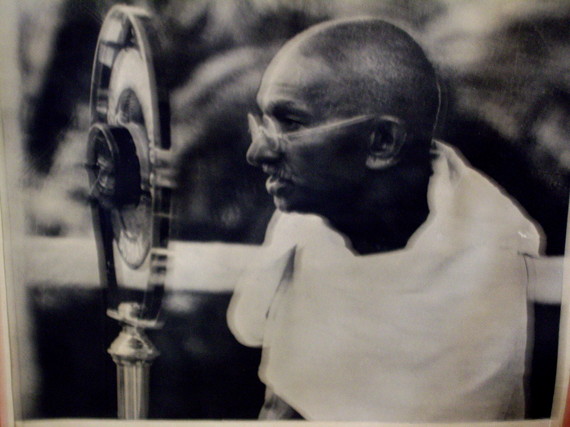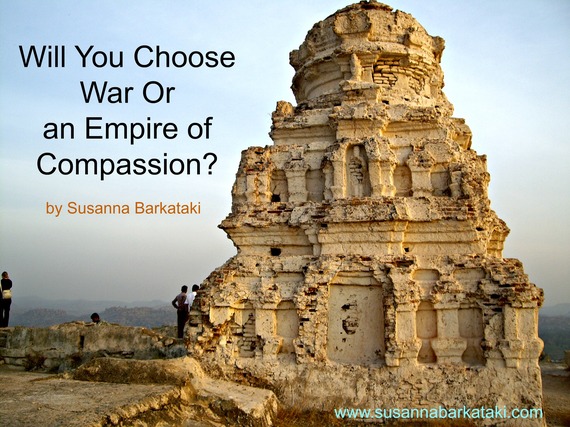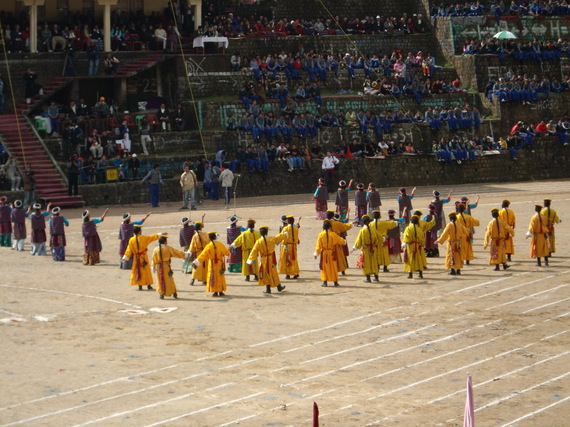Sometimes, we think that who we are and what we do doesn't matter to the world.
We've heard that if we don't learn from history, we're condemned to repeat it. I'd prefer to learn.
In light of recent events, I'd like to share a story of the power of one person's peace in the ancient world that is still impacting us now.
Listening to this story, we can always remember, peace is a choice. What will we chose today?
In Ancient India around 260 BCE a young emperor named Ashoka came to be King of the Maurya empire. He inherited a huge kingdom that covered most of the Indian sub-continent, excepting a few independent empires in south and east India. Ashoka did things the way they had always been done, lived large, ruled fiercely, desired more and more conquests. He had everything; he was miserable.
To get even more land and riches, he invaded the independent kingdom of Orissa, waging a war so brutal and bloody that men, women, children and animals lay in the streets. He won.
The day of his victory, Ashoka walked through the town, amongst piles of decaying flesh and the wails of survivors. He felt sick and stricken by the suffering caused at his command.
All around him there was suffering. Deep inside him, suffering. He couldn't believe what he had created. What was the point of all this suffering for more and more conquest, he wondered.
At that moment, he saw a peaceful orange robed monk walking through the battlefield. The monk looked calm, happy and graceful in his cloak of peace.
At that moment on the bloody battlefield, Ashoka experienced a turning point in his life. He realized he had everything he could want, but he was deeply suffering. This monk clearly had nothing, but was happy. He had to understand how this could be.
Ashoka stopped him. "Sir, you appear to be happy amidst all this suffering. How is this so? Please teach me."
So it came to be that the monk who carried nothing began to teach the emperor who seemed to have everything.
From this chance encounter on the battlefield, the monk taught Ashoka what he knew. Ashoka transformed from a blood-thirsty tyrannical ruler into a compassionate leader known far and wide for his goodwill.
He became the first ruler ever to issue environmental and animal protection policies as well as those for social welfare. He has gone down in history books as a progressive, just and fair ruler.
Transformed and peaceful, Ashoka realized the teachings of compassion and care of all were too precious not to share, so he sent emissaries as far as the Hellenic world, into modern day Greece and the Middle East, out to Thailand and Cambodia, and even sent his own son and daughter down to Ceylon, now Sri Lanka, to share this new creed of compassion.
The practice of that one peaceful monk is still influencing the world today through the teachings Ashoka, his friends and family spread, now known widely as Buddhism. The name of the teachings of compassion is less important than the practice.
Ashoka is known as a Buddhist leader, but it is unclear whether he ever converted to Buddhism.
What his religion is doesn't matter; what is more important is that he thought it important enough to carve in stone all over his empire edicts that demonstrate peace, care and compassion for all beings. His teachings influenced many modern leaders, known and unknown, such as Mahatma Gandhi.

So the question for us is: For whom are we that peaceful monk?
This is the application of ahimsa in yoga: living so our compassion, care, presence and peace can have lasting impact on friends, family and community. Similarly, our anger, hatred, vengefulness, irritation or distractedness also leave an impression as well.
Most of us don't have the power of ruling an empire. But Ashoka's story shows us that empires may not get us where we want to be anyway.
We are the kings and queens of the empire of our compassion. We each have a choice to act with peace in every moment.
In this time of hatred, revenge, fear and injustice, walking, sitting, speaking and giving generously of our love, kindness and compassion may be a truly revolutionary act.
We never know what life and world changing consequences it may cause.
"Building community is to the collective as spiritual practice is to the individual." -Grace Lee Boggs
Build with me at www.SusannaBarkataki.com


